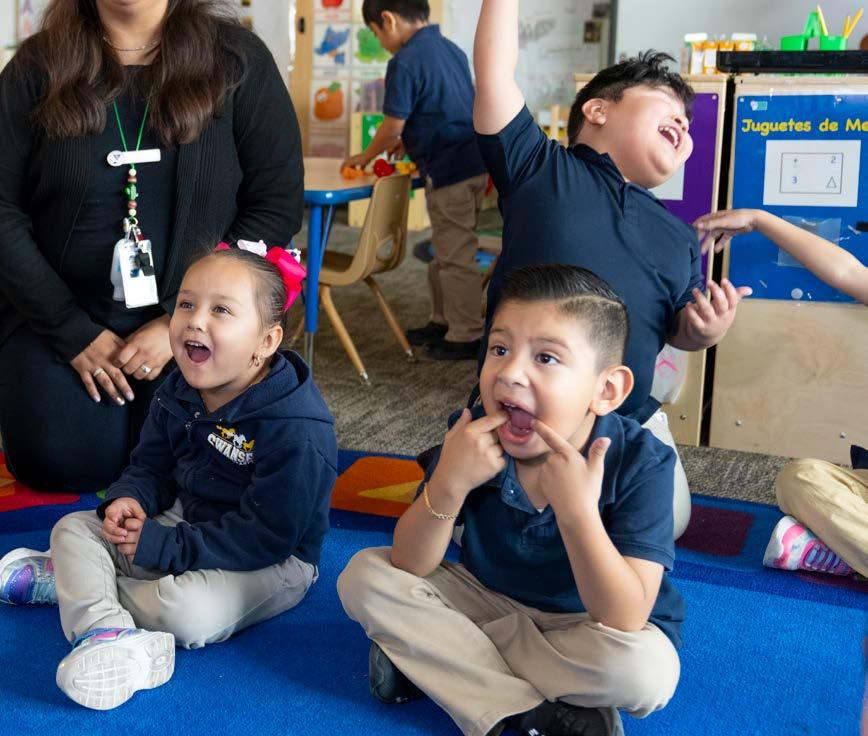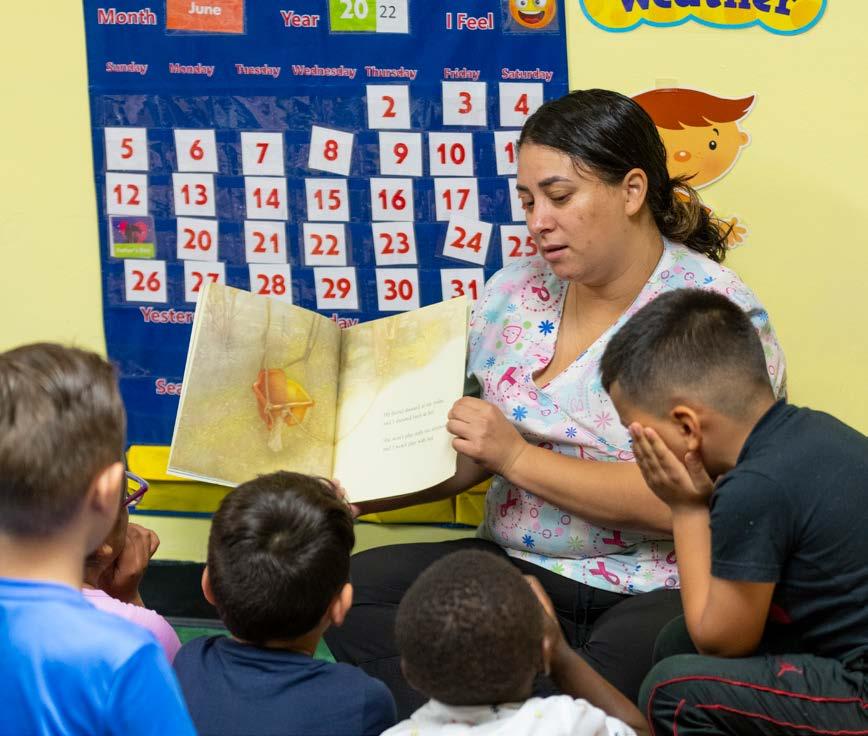
9 minute read
EXECUTIVE SUMMARY
DPP IS GUIDED BY OUR VISION that every Denver child has equitable access to a strong foundation to thrive in kindergarten and beyond.
We Work Towards This Vision
THROUGH OUR MISSION to transform the futures of young children and their families by strengthening and funding the early childhood experience.

In service of creating a more equitable early childhood landscape and a more just world, we commit to:
1 Grow our knowledge and awareness of inequities and their root cause.
2 Drive access, choice, and quality in early childhood education.
3 Advocate for systems-level policy changes that address harm.

4 Lead in action and words with courage, tenacity, and accountability.
DPP is entering an unprecedented period of change and growth. As such, our strategic orientation over the next three years is one of growth in funding, programming, and infrastructure to serve Denver’s families and young children better. We seek to grow in ways that create equity, are sustainable, and model the way forward for early childhood supports that transform the lives of families. DPP commits to bold action to help eliminate differences in educational, well-being, and health outcomes as a result of systemic racism, generational poverty, and discrimination through our role in early childhood education.
THROUGH OUR PLANNING PROCESS, WE IDENTIFIED AND COMMITTED TO FIVE STRATEGIC GOALS:
1 Increase Enrollment For 3- and 4-Year-Olds in Denver, Prioritizing Around Need.


2 Enhance the Early Childhood Workforce.
3 | Activate Early Childhood Policies, Programs, and Models Outside of Licensed Care.
4 | Address Unmet Needs in the Early Childhood System.
5 Ensure DPP has the Infrastructure, Staffing, and Governance to Thrive.
TO IMPLEMENT EACH OF THOSE GOALS, DPP IS EMPLOYING THE FOLLOWING CROSS-CUTTING STRATEGIES:
• Equity and Inclusion
• Operations and Infrastructure
• Strategic Communications
• Intentional Impact
• Advocacy and Community Engagement
• Visionary Leadership and Governance
• Funding and Financial Management
• Quality
• Iterative Innovation
This plan has laid out DPP’s priorities for the next three years, beginning with our guiding principles, our unwavering and living commitment to creating a more equitable early childhood system, and to lead in a dynamic state and national early childhood environment. Work is already well underway to fully realize the scope of our new strategic plan –a living, breathing roadmap that we will continue to revisit over the months and years ahead. We look forward to involving those we serve and partner with in this process and working to accomplish our vision, mission, and goals together.
Introduction
The Denver Preschool Program is pleased to share our strategic plan for 2023-2025. This plan represents an extensive planning effort by the board, staff, providers, partners, and community members to center in equity and to best serve Denver’s youngest learners and their families. Within this narrative, we share our newly-revised guiding principles and equity commitments and our strategic direction and priorities. Also included are highlights of the stakeholder feedback supporting analysis and insight that helped inform our next steps for the coming years.
Purpose
Strategic planning is a process through which an organization agrees upon and builds commitment to a set of priorities and strategies essential to fulfilling its mission. These priorities are fulfilled by actions that make measurable and meaningful progress on the mission over a defined period of time. DPP has long been committed to being guided by a strategic plan to focus our efforts and resources in mission-aligned ways that are responsive to the needs and changes within the early childhood system, the Denver community, and the larger context of the environment in which we operate. Our previous plan guided our work from 2017 through 2022, with strategic adjustments along the way to navigate through the COVID-19 pandemic and the shifting landscape that included the passage of Proposition EE, set to fund universal preschool for the state of Colorado. We look forward to implementing our plan for 2023-2025, a period of time that promises significant change and growth in early childhood education.
How Dpp Uses Its Strategic Plan
This document is used for internal and external purposes—to guide work planning, financial and human capital investments, strategic decision-making, and community and partner engagement and communication. The document is designed to be a polished presentation of strategic planning process results, as well as a living, breathing, changeable document that reflects the organization’s needs over time and in changing conditions.
About Dpp Overview
DPP makes quality preschool possible for Denver families with 4-year-old children through a dedicated sales tax, first approved by voters in 2006 and renewed and extended in 2014. DPP has provided nearly $150 million in tuition support to help more than 65,000 Denver children attend the preschool of their family’s choice, establishing each child’s foundation for lifelong learning and success through the 20212022 program year. Children who attend an early childhood education program are more prepared for kindergarten, leading to stronger early language, literacy, math, and social and emotional skills, and a higher likelihood of graduating high school, attending college, and succeeding in their careers.
To ensure every Denver child can experience the power of preschool, DPP offers tuition credits to every Denver family with a 4-year-old. But that is not enough. DPP also empowers early childhood educators (through professional development, coaching, scholarships, and additional quality improvement resources), engages in extensive community outreach, and advocates at the city, state, and national levels to reimagine the early childhood education ecosystem as a whole. To better support those families with the greatest financial need, we supplement our tuition credit system with scholarships and offer tuition support for 3-year-olds.
In addition, in 2022, DPP was selected as the Local Coordinating Organization (LCO) for Universal Preschool (UPK) Colorado. With both funding streams, Denver families will have more money to offset the cost of care and DPP can think strategically about how we utilize our funding to deepen and expand services.

Dpp History
DPP is entering its 17th year of funding and is currently in its 16th year of program operations. During these years, DPP has continued to evolve, innovating its programming and delivery of services, maturing as an organization, and emerging as a model for funding, access, quality, and choice in early childhood education for Colorado and the nation. The timeline below details significant milestones in DPP’s history.
2004
Mayor Hickenlooper’s Leadership Team on Early Childhood Education convenes summit on early childhood education
2006
Denver City Council places preschool proposal on November ballot
2007
First preschool enrolls
DPP tuition supports helps first child attend preschool
2008
Online “Find a Preschool” tool helps first Denver family find the right preschool for their child
2009
In first full year of operation, enrollment leaps from just 7% to over 60% of Denver’s 4-year-olds
2010
As DPP helps its 10,000th child attend preschool, enrollment grows to exceed 70% of Denver’s 4-year-olds
2011
CLASS™ integration begins, adding a critical focus on quality instruction to DPP’s overall rating and improvement system
2012
For the third straight year, independent evaluation confirms that the vast majority of DPP graduates leave preschool ready for kindergarten
2013
DPP launches inaugural Preschool Showcase for Denver’s families
2014
Successful reauthorization and expansion of DPP, increasing the sales tax from .12 to .15 and expanding our reach to support all Denver preschoolers
2015
Brought back summer funding to support children year-round

2016
DPP celebrated 10 years of programming and supporting the Denver community
2017
82-88% of sampled preschoolers received a score that indicated they were prepared to succeed in kindergarten
2018
DPP expanded our QI program to 3-year-old classrooms beginning with the 2018-2019 school year
2019
DPP welcomes Elsa Holguin as the next President and CEO
2020
DPP provided more than $785,000 in DPP Strengthening Grants funding directly to providers to mitigate the negative financial impacts of the pandemic
2021
DPP launched Preschool for 3s, funding our first pilot cohort of 3-year-olds in 20212022
2022
DPP selected by the Colorado Department of Early Childhood to be Denver’s Local Coordinating Organization for Universal Preschool Colorado
For an expanded list of DPP milestones, see page 28
Centering In Equity Our Commitment To Bold Action
Our work is human-centered, inclusive, and intentionally threads equity, diversity, inclusion, and justice in our work. Our journey intends to move beyond statements of commitment to action, accountability, and measurable outcomes. We recognize the remnants of the intentionally designed systems that have oppressed historically marginalized communities, causing historical harm, and we are committed to doing our part to dismantle these systems of oppression.
Our Commitment To Shared Definitions
We recognize that equity work is a continuous cycle of reflection and action to address power and privilege that harms historically marginalized communities. Our first focus was to create shared language, defining the following terms while acknowledging the historical and present-day harms that contribute to the inequities we seek to remedy.
Equity
We define equity as the condition that allows all children and families to thrive by receiving all necessary support to achieve their personal well-being, regardless of social or cultural characteristics.
We recognize the past and present impacts of structural and institutional racism, and we know that these oppressive systems continue to harm and disadvantage historically marginalized groups. Inequities exist based on race, ethnicity, language, sexual orientation, age, gender identity and expression, social and economic status, household structure, religion, disability, and country of origin.
Inclusion
We define inclusion as policies and practices that welcome every child, recognize their strengths and fulfill their families’ desire to participate in early childhood education.
Understanding the ongoing inequities in access and opportunity and how these create disadvantages for historically marginalized students and families is crucial for DPP’s work toward equity.
Diversity
We define diversity as variation among individuals regarding their backgrounds and lived experiences. These may be experiences related to social identities, including but not limited to race, ethnicity, language, sexual orientation, age, gender identity and expression, social and economic status, household structure, religion, disability, and country of origin.
We acknowledge that dominant white spaces have been initially designed to be exclusive and not inclusive of diverse identities and often are not representative of the communities we serve, both socially and economically.
We recognize that the exclusionary practices in school settings throughout history have ramifications on the current experiences of historically marginalized students. Racism is still prevalent in our educational institutions and the institutional barriers that impede access and opportunity for historically marginalized students. Understanding these exclusive policies and practices will support DPP’s work toward inclusion, where students and families feel a sense of belonging and respect to help them reach their full potential while acknowledging the diversity of choice and need.
Justice
We define justice as the full and equal participation of all children and families in a society intentionally created to meet their needs.
Social justice includes a vision of society in which the distribution of resources is “equitable,” and all members of a space, community, institution, or society are “physically and psychologically safe and secure.”
Educational justice is collectively reimagining what education can look and feel like when we center the voices of the most marginalized. It engages in dialogue with the community about how all students, especially Black, Indigenous, and students of color, can enter school as their most authentic selves and feel supported and safe.
We recognize how power, privilege, and oppression impact our experience of our social identities. Schools across the nation make it clear that fair distribution of resources and equitable treatment don’t always happen. Achieving educational justice is when students don’t have to conform to the status quo to feel successful and when educators become adept at responding to student needs.
Our Pillars To Continue Our Commitment
Access, Quality, and Choice, while a part of our defined terms, have been steady pillars by which we live and we continue to honor them in the world we do. We acknowledge that we cannot move in good faith towards our vision and mission if access, quality, and choice are not in alignment or a part of our pursuits to achieving equity.
Access
We define access as the ways in which educational institutions and policies ensure families have equal and equitable opportunities to take full advantage of early education programs that best meet their needs.
We recognize that factors such as race, gender, sexual orientation, disability, English-language ability, and socioeconomic status, in addition to factors such as relative community affluence, geographical location, or school facilities may contribute to marginalized or underprivileged students having less “access” to educational opportunities than other students.
Quality
We define quality education as one that focuses on the whole child and the social, emotional, mental, physical, and cognitive development of all students regardless of gender, race, ethnicity, socioeconomic status, etc.
We recognize that quality should be based on providing excellent teaching, utilizing and providing access to developmentally appropriate and effective learning tools, and establishing a supportive learning environment. A quality education provides the outcomes needed for individuals, communities, and societies to prosper. A program should be considered of high quality if it is equitably accessible, provides positive and fair experiences for all children, especially those who have been historically marginalized, and actively works to identify and close disparities in child outcomes where they exist.
Choice
We define choice as simply the idea that all parents, regardless of means, have the freedom to choose where and how their children are educated. School choice allows DPP funds to follow students to the schools or services that best fit their needs, whether that’s to a public school, private school, charter school, home school, or any state-licensed learning environment families choose.
We recognize that the early childhood system is market-driven in that it gives more options to parents that have the ability to navigate the system and the financial resources to find high-quality care.

